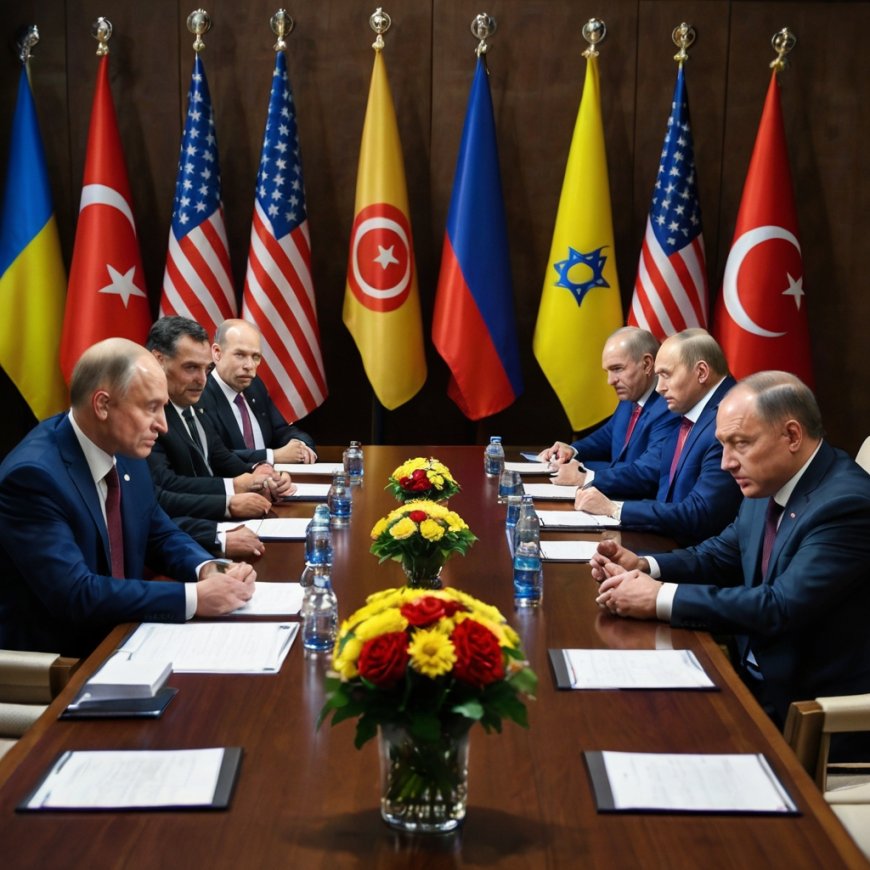Putin Not on List for Ceasefire Talks with Zelenskyy in Turkey: What This Means for the Ukraine Conflict
Russian President Vladimir Putin is excluded from the upcoming ceasefire talks in Turkey with Ukrainian President Zelenskyy. This article analyzes the geopolitical impact and US foreign policy reactions.

The upcoming ceasefire talks scheduled to take place in Turkey have garnered significant global attention. Ukrainian President Volodymyr Zelenskyy is set to attend, hopeful for a diplomatic breakthrough to end the ongoing war with Russia. However, Russian President Vladimir Putin's absence from the official list of delegates attending these negotiations has raised many questions about the future of peace efforts in the region. This article explores the implications of Putin's non-attendance, the role of the United States, and how this development could reshape geopolitical dynamics in the Ukraine conflict.
Background: The Ukraine-Russia War and Peace Efforts
Since Russia's full-scale invasion of Ukraine in February 2022, multiple attempts to broker peace have faced numerous obstacles. Ceasefire talks have often stalled due to deep-rooted mistrust, conflicting objectives, and external geopolitical pressures. Ukrainian President Zelenskyy has repeatedly expressed the need for direct dialogue with Putin, aiming to secure a face-to-face meeting that could pave the way for a sustainable ceasefire.
Despite Zelenskyy's calls, the list of delegates for the upcoming talks in Ankara notably excludes Putin. This absence is emblematic of the broader challenge in resolving the conflict—without the direct involvement of Russia's top leader, the talks risk being perceived as symbolic rather than substantive.
The United States’ Position: A Delicate Balancing Act
The United States, a key player in the Ukraine conflict, has also shown signs of uncertainty in its approach to the talks. While former US President Donald Trump, who is currently on a Middle East tour, hinted at possibly joining the negotiations if Putin did so, official statements from the Trump administration confirm that his participation is unlikely. Instead, Secretary of State Marco Rubio has arrived in Turkey to represent US interests during these critical discussions.
This situation reflects a complex US foreign policy balancing act. On one hand, Washington seeks to maintain a strong stance against Russia’s aggression. On the other, it faces internal political divisions regarding the best strategy to support Ukraine and achieve peace. Some Republicans criticize Trump's perceived reluctance to pressure Putin sufficiently, while others push for tougher sanctions against Russia, particularly targeting its energy exports.
Growing Calls for Stronger Sanctions
Senator Lindsey Graham, a close ally of Trump but also a vocal advocate for a tougher line on Russia, has spearheaded efforts to impose steep tariffs on countries buying Russian oil and gas. These sanctions aim to choke Russia’s financial resources, pressuring Moscow to reconsider its military ambitions in Ukraine. However, the efficacy and geopolitical consequences of such sanctions remain hotly debated among policymakers.
Ukraine’s Strategy: Pressuring Russia and Keeping Diplomatic Channels Open
President Zelenskyy’s decision to attend the talks regardless of Putin’s presence sends a clear message of Ukraine’s willingness to pursue diplomacy. It also puts additional pressure on Russia by spotlighting Putin as the primary obstacle to peace. Zelenskyy has consistently emphasized that any sustainable resolution must involve direct engagement with Moscow’s leadership.
However, Zelenskyy’s approach is not without risks. Attending talks without Putin could limit the scope of agreements reached and potentially frustrate Ukrainian public opinion, which largely demands a strong defense against Russian aggression. Yet, this diplomatic gamble may also serve to isolate Russia further on the international stage if Moscow continues to reject meaningful participation.
Trump’s Evolving Stance and Its Impact
Donald Trump’s position on the Ukraine conflict has fluctuated throughout the war. Initially critical of Zelenskyy for allegedly being reluctant to negotiate, Trump’s narrative seems to be shifting as he faces political pressures and the realities on the ground. His recent threat to walk away from the talks if no progress is made underscores the fragility of this diplomatic process and the high stakes involved.
What Putin’s Absence Means for the Peace Process
Putin’s decision not to attend the Turkey talks could signal several underlying factors. It may indicate a strategic choice to avoid direct confrontation or negotiation, reflecting confidence in Russia’s current military and political position. Alternatively, it could be a tactic to extract more favorable terms by delegitimizing the talks.
Without Putin’s presence, the ceasefire discussions risk becoming a dialogue among proxies rather than a genuine negotiation between the conflicting parties. This dynamic may prolong the conflict or lead to a fragile and temporary agreement lacking enforceability.
International Reactions and Future Prospects
The international community watches closely as Turkey hosts this critical diplomatic effort. Countries supportive of Ukraine’s sovereignty advocate for firm measures against Russia while encouraging dialogue. Meanwhile, global powers weigh their strategic interests in the region, mindful that the Ukraine conflict’s resolution will have long-lasting implications for international stability and security.
Experts suggest that unless Putin becomes directly involved, the current talks may only serve as a stepping stone to future negotiations rather than a conclusive peace settlement. The evolving roles of the US, Turkey, and European partners will be crucial in shaping what comes next.
The exclusion of Vladimir Putin from the ceasefire talks in Turkey represents a significant challenge to the peace process in Ukraine. It highlights the complexities of modern geopolitical conflicts where leadership decisions weigh heavily on diplomatic outcomes. As Zelenskyy presses forward and the US navigates its own policy dilemmas, the world remains hopeful yet cautious about the prospects for ending one of the most consequential conflicts in recent history.
While business and politics intertwine, the human cost of the war urges swift and genuine negotiations. The coming weeks will be pivotal in determining whether diplomacy can prevail or if the conflict will endure with heightened consequences for global peace and security.
What's Your Reaction?
 Like
0
Like
0
 Dislike
0
Dislike
0
 Love
0
Love
0
 Funny
0
Funny
0
 Angry
0
Angry
0
 Sad
0
Sad
0
 Wow
0
Wow
0

































